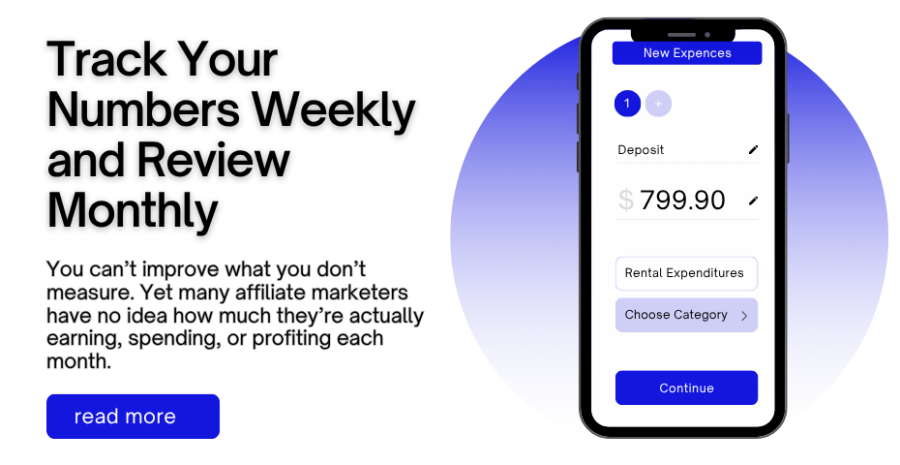

In the fast-paced world of affiliate marketing, much of the spotlight is focused on high-ticket commissions, traffic hacks, sales funnels, and content strategies. And while these are all crucial for growing a successful online business, there’s one element that often gets overlooked — personal finance.
It's the invisible engine that either powers or paralyzes your entrepreneurial progress. Without a solid grasp of how to manage money, even the most talented internet entrepreneur can find themselves stuck in a loop of financial stress, inconsistent cash flow, and missed opportunities.
It’s not just about how much you earn; it’s about how wisely you manage, allocate, and multiply what you earn.
Affiliate marketing offers unlimited income potential, but if that potential isn't supported by disciplined financial systems, it becomes a trap rather than a tool for freedom.
Internet entrepreneurs often start with limited resources, and the temptation to spend every dollar on tools, ads, or courses can be overwhelming. But the real magic lies in mastering money habits that protect, preserve, and scale your wealth.
This is not a call to penny-pinch — it's about learning how to make your money work harder than you do. True freedom comes when your financial foundation is stable, giving you the space to think long-term, pivot with confidence, and invest wisely in opportunities that bring exponential returns.
The financial rules you follow — or ignore — will directly influence your longevity and success as an affiliate marketer. Financial literacy is the real power source behind your entrepreneurial engine.
Whether it’s learning how to budget your monthly income, separating business and personal expenses, planning for taxes, or reinvesting profits strategically — all these habits create a structure where your money starts to serve you.
The game isn’t just about generating leads and sales, it’s about building a life where you control the narrative — not your bills, debts, or lack of planning. Money management gives you the power to say "yes" to new ventures and "no" to distractions, based on wisdom, not desperation.
Affiliate marketing is a marathon, and the way you manage your finances determines whether you reach the finish line or burn out halfway.
In this blog, we’ll dive deep into 7 financial rules every online entrepreneur must know to build a business that doesn’t just earn money — but multiplies it.
These aren’t complicated theories or boring spreadsheets. These are real, practical financial habits that will turn your affiliate marketing hustle into a sustainable, scalable business.
By mastering these principles, you’ll build confidence, clarity, and consistency in how you grow — both your bank account and your business.

One of the biggest mistakes internet entrepreneurs make is treating affiliate marketing like a hobby or side hustle. When you casually approach your business, you casually handle your finances. The first step to financial control is adopting the mindset that this is a real business with real responsibilities and real financial implications.
This means setting up a separate business bank account, tracking income and expenses, and understanding your numbers as if you were running a brick-and-mortar enterprise. When you know where every dollar is coming from and where it's going, you begin to develop strategic control over your financial future.
Budgeting becomes easier, decisions become data-driven, and confidence starts replacing chaos. Most affiliate marketers jump from shiny object to shiny object because they don't have financial clarity guiding their direction.
By treating your affiliate efforts as a legitimate business, you naturally step into the role of a financially responsible CEO, not just an opportunity chaser.

Blurring the lines between business and personal finances is a recipe for confusion and eventual disaster. If you’re using your personal account for ads, subscriptions, or affiliate payouts, you're setting yourself up for a tangled financial mess that will make taxes and tracking nearly impossible.
Establish a separate business bank account and payment processor (like PayPal Business or Stripe) to handle all business-related transactions. This clear division helps you see how your business is truly performing, simplifies accounting, and makes it easier to calculate profits, losses, and what’s available for reinvestment.
More importantly, it trains your mind to respect the boundaries between your business and your lifestyle. You avoid spending business revenue on non-business expenses and can better assess how much to pay yourself each month.
Clean money systems bring clean mental space, and that clarity is one of the best assets an entrepreneur can have in an otherwise noisy and unpredictable market.

As an affiliate marketer, no one is withholding taxes on your commissions, so if you’re not budgeting for taxes, you’re risking an unpleasant shock come tax season.
Many new entrepreneurs get their first big commission, celebrate with a spending spree, and forget that 20–30% of that money actually belongs to the government.
Discipline yourself to set aside a percentage of every commission — ideally in a separate savings account — specifically for taxes.
Use tools or apps that help you estimate your quarterly obligations, and if possible, work with a tax professional to ensure compliance and deductions.
Remember, tax planning isn't just about protection — it’s also about profit. Knowing what expenses can be written off, how to structure your business entity for better tax treatment, and how to maximize your deductions can save you thousands each year.
When you’re prepared for taxes, you eliminate stress and operate with peace of mind, which gives you the freedom to focus on what really matters — scaling your business.

One of the most powerful habits you can develop is paying yourself a consistent salary. Many affiliate marketers fall into the feast-or-famine trap — some months are booming, others are barren. Without a consistent pay structure, it's easy to overspend in the good months and panic in the slow ones.
Set a baseline salary you can comfortably pay yourself each month, even if it’s modest at first. This creates predictability and stability in your personal finances, allowing you to plan, save, and invest with more confidence.
When your salary is separate from business revenue, it becomes easier to distinguish between personal needs and business reinvestment. This approach also helps you think like an entrepreneur and not just a commission earner.
You're no longer dependent on every single sale — you’re building a system that supports you. Eventually, as your business grows, your salary can grow too.
But start with discipline, and build a stable financial rhythm that supports long-term sustainability.

Every dollar you earn in affiliate marketing is a seed that can either be spent impulsively or planted intentionally. Smart entrepreneurs reinvest strategically in areas that bring long-term growth: better tools, education, automation, branding, or building their own products.
But the key word is "strategically." Avoid emotional spending based on hype or pressure. Just because someone says a course, funnel system, or traffic method is the next big thing doesn’t mean it's right for your business. Let your financial data, goals, and current stage of growth guide your reinvestment decisions.
Allocate a fixed percentage of your monthly profit toward reinvestment — maybe 20–30% — and decide in advance where that money will go.
This approach keeps your growth intentional, not reactionary. When your business expenses are tied to a strategy instead of emotions, you build assets instead of accumulating liabilities.
Your money starts to multiply, and your vision becomes reality faster and more efficiently.

The online world moves fast, and things can change overnight. Ad accounts get shut down, algorithms shift, or a key affiliate partner suddenly changes commission terms. That’s why having an emergency fund is essential. This fund isn’t just for personal emergencies — it’s your business safety net.
Aim to build at least three to six months of essential business and personal expenses in a liquid savings account.
This cushion gives you the flexibility to pivot when things go wrong and to seize opportunities when they arise without relying on credit or desperation.
Entrepreneurs who operate from a place of security make smarter, more creative decisions because they’re not thinking about survival. An emergency fund also buys you time — time to test, adjust, and improve without panic.
It's not a luxury — it’s a necessity for any serious affiliate marketer who wants to build a resilient and lasting business.

You can’t improve what you don’t measure. Yet many affiliate marketers have no idea how much they’re actually earning, spending, or profiting each month. Financial success starts with financial awareness. Build the habit of reviewing your numbers every week — income, expenses, conversions, ROI on campaigns, etc.
Then, take one day a month to analyze your financial performance, spot trends, and make adjustments. This regular review helps you identify what's working, what’s not, and where leaks are happening in your financial pipeline.
Use a simple spreadsheet, accounting software, or a tool like QuickBooks or Notion — whatever works for you.
The goal is to stay connected to your money story, not be surprised by it. Entrepreneurs who track their finances consistently outperform those who wing it. It creates focus, accountability, and momentum.
Knowing your numbers is the difference between running a business and running blind.
Affiliate marketing is a powerful gateway to financial independence, but only if it's paired with intelligent money management. Too many online entrepreneurs get caught in a cycle of making money and losing it just as fast, constantly chasing the next sale without ever building real wealth.
If you want long-term freedom — the kind that gives you options, peace, and legacy — then you must master the financial side of your business just as much as the marketing side. These seven financial rules are more than just tips; they are pillars that support sustainable growth and entrepreneurial mastery.
Each one creates a layer of control, discipline, and clarity that strengthens your ability to lead a business that funds your vision, not your stress.
By treating your affiliate business like a real business, separating your finances, planning for taxes, and paying yourself first, you build stability. By reinvesting strategically, protecting your downside with an emergency fund, and tracking your progress weekly, you fuel smart growth.
Together, these practices help you transform erratic income into predictable profit — and chaotic hustle into organized success. Financial literacy empowers you to turn short-term wins into long-term wealth.
The goal isn’t just to make money online; it’s to keep it, grow it, and use it to build a life that reflects your highest values. So start today.
Choose one rule to implement immediately, and build from there. Wealth is built step by step — and every step you take with intention brings you closer to freedom.
The choice is yours—make it count.
....................................................................................................................................................................................................
About: Andries vanTonder
Over 46 years selfemployed
He is a Serial Entrepreneur, an Enthusiastic supporter of Blockchain Technology and a Cryptocurrency Investor
Find me: Markethive Profile Page | My Twitter Account | My Instagram Acount | and my Facebook Profile.
